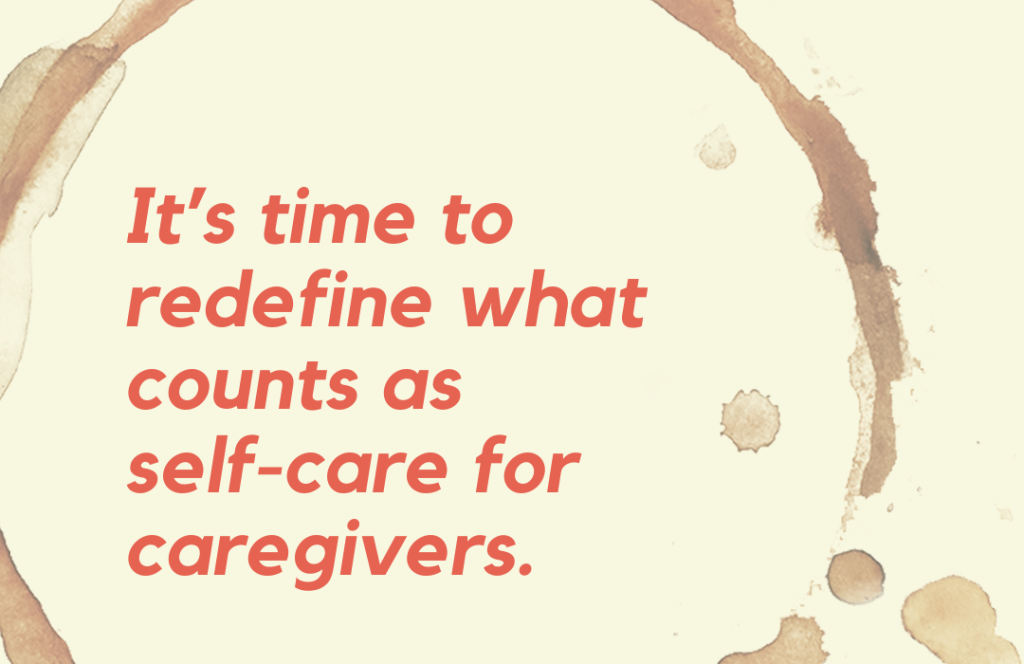If you’ve been the parent and/or caregiver to a medically complex or disabled child for more than one or two seconds, you’ve probably had these phrases directed at you:
“Make sure you take care of our mental health!”
“Don’t forget to do things for yourself!”
“Self-care is so important!”
And for the record, all of that is true. Our kids need us to be healthy and available so we can take care of them. That’s really hard when we’re sick and burnt out and emotionally drained. But while that sounds great in theory, but we often don’t have access, time, or energy to do many typical “self-care” activities.
When are we supposed to find time for a bubble bath in between tube feeds, therapy and specialist appointments, and phone calls to the pharmacy? (Being on the phone with the DME while soaking in the tub is probably not anyone’s idea of relaxing…)
And don’t get us started on the monetary restraints. Even if we had the time to get a massage each week, it’s cost prohibitive considering how many caregivers have to change their employment status or leave the workforce altogether due to their caregiving responsibilities and lack of societal support.

It’s time to redefine what counts as self-care
So it’s fair to say that “typical” self-care isn’t going to be particularly helpful or accessible to many caregivers.
But one way that some caregivers have found to bridge this gap is by diving even further into an activity that so many of us do every day anyway: advocacy.
Out of urgency and necessity, we, as caregivers, often find ourselves advocating to have our child’s medical, educational, and community support needs be met on a regular basis.
Building up advocacy skills and leaning further into advocacy work adds another layer of purpose and energy to the work we already do, and the success of that advocacy work makes a real mental health difference for many of us, in place of the “self-care” platitudes we’re often given.

Embracing advocacy as self-care doesn’t happen overnight
Jumping into advocacy and feeling like an effective advocate doesn’t happen overnight though. The process many of us take to this place of advocacy-as-self-care is through something called “critical consciousness.”
“Critical consciousness occurs when an individual becomes aware of how social context drives oppression and heals themselves by taking action to undermine that oppression.” (Alexis Jemal, 2017)
In other words, it’s when we understand how systems work against us and take action to make things better. We get so fed up with the way things are that we feel motivated not just to change things for ourselves, but advocate to make entire systems better for everyone who is impacted by those systems. We can no longer sit by and simply let the systems happen to us – we start pushing back and influencing these systems.

Embracing advocacy as self-care has benefits for the mental health of caregivers
Researchers have discovered that using words like “advocacy” and “activism” to describe work that we do, have had positive mental health benefits for caregivers and those in similar positions to us.
Caregivers who identify as advocates often get a boost of confidence and motivation for work that can otherwise feel dull and repetitive. And the act of viewing this work as a kind of self-care can have a healing effect for many caregivers.
It might not fit within the traditional understanding of self-care, but it can be a much more powerful buoy for our mental and emotional wellbeing and a strong guardrail against burnout, especially when we are able to channel that advocacy to not only benefit our children, but to garner us the support we need as well.
Advocacy may not be accessible for everyone… and that’s okay too.
While this advocacy-as-self-care model is helpful for the mental health of some caregivers, not all of us have space, emotional energy, nor the capacity to engage in this type of work. We won’t all feel the same self-care benefits, just like not all of us enjoy reading books on a rainy day or going to a spa. But for those of us who do, it’s just one more tool in the toolbox to care for ourselves as we provide care for the children we love as well.
This post was inspired by the article “The Politic Self: The Possible Therapeutic Benefits of Political Action,” written by Brandon Isaacson, M.A. NCC, LAC.
Sources
Isaacson, Brandon. “The Political Self: The Possible Therapeutic Benefits of Political Action.” Be Well Therapy Group | Philadelphia Therapy, 22 May 2022, bewelltherapygroup.org/2022/05/11/the-political-self-the-possible-therapeutic-benefits-of-political-action.
Jemal, Alexis. “Critical Consciousness: A Critique and Critical Analysis of the Literature.” The Urban review vol. 49,4 (2017): 602-626. doi:10.1007/s11256-017-0411-3 https://www.ncbi.nlm.nih.gov/pmc/articles/PMC5892452/#:~:text=2